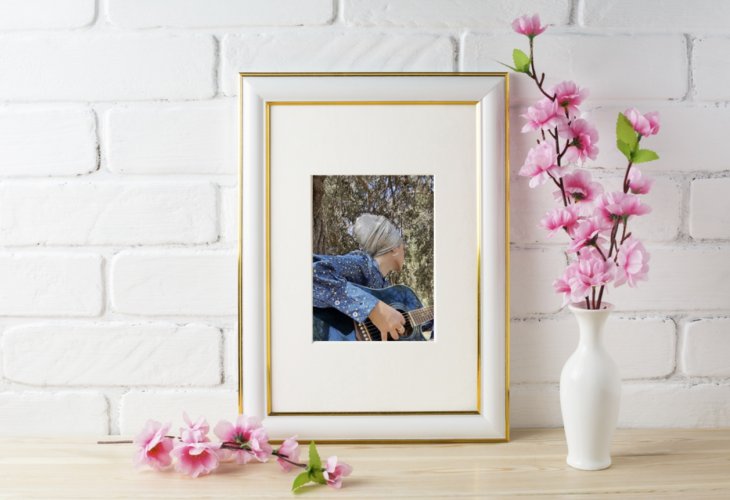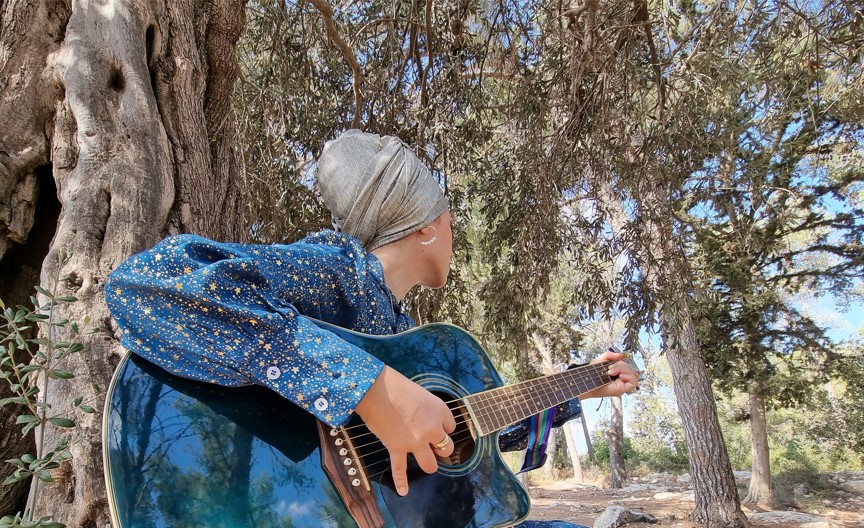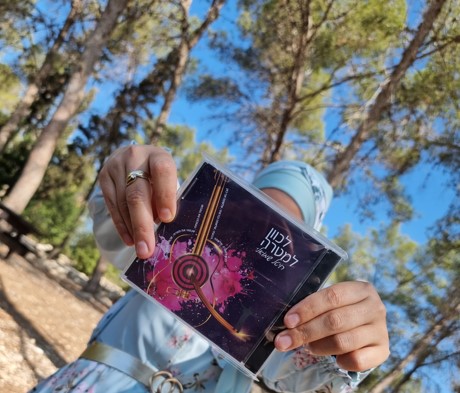"At Age 12, My Parents Told Me: 'From Now On, We Keep Shabbat'"
Revital Shmueli grew up in a home distant from Judaism. At age 12, her parents began embracing religion, but she was busy with performances and singing. What ultimately transformed her life, and what led to her brave decision to sing only about sacred purity and not perform in front of men?
 (Photo: Singer Revital Shmueli)
(Photo: Singer Revital Shmueli)She is the wife of a scholar, mother of five children, living in Beit Shemesh, and until recently was a well-known kindergarten teacher. At first glance, you might see her as any other standard Haredi woman. Nothing outward hints at the extraordinary life story that Revital Shmueli experienced.
A story spanning many years, during which she searched for truth, and through much effort, thinking, and even singing, she paved her way to a fulfilling life — a life of Torah and mitzvot.
A Childhood of Songs
When speaking with Revital about her life, she takes us to the first station — the home she grew up in, in the Ramot Eshkol neighborhood in Jerusalem. "I am the eldest daughter in a family of five," she shares, "Our home was 'secular-traditional,' very warm and loving. As small children, we didn’t know what Shabbat observance was, but every Friday night we made Kiddush on wine, and then traveled by car to Grandma. What really mattered to my mom was not lighting fire on Shabbat — it was crucial for her, and this, of course, carried over to us."
From a young age, Revital felt a love for and connection to music. She was often invited to performances, standing center stage and singing every chance she got. "Initially, it was mainly at school," she explains, "Later, I became part of a band managed by the Jerusalem Municipality called 'Jerusalem Mix.' I greatly enjoyed being part of the band, along with other boys and girls, we rehearsed often and performed across the country and the world at various ceremonies and events."
At some point, she began creating her own music, playing it on guitar, writing, and composing. "My biggest dream was to become a famous singer," Revital says.
Did you enjoy your involvement in music? Was it difficult for you as a child?
"Quite the opposite — the performances never burdened me. They brought me joy and fulfillment. I felt that was how I expressed myself. Only later, when I began to become more religious, did I start to feel the emptiness in that life. But that came many years later."
"Suddenly We Started Keeping Shabbat"
The first steps in Revital's journey towards Judaism were thanks to her parents. "I have exceptional parents," she starts, "They are very different from each other but complement each other remarkably. My father is a taxi driver, and my mother a retired police officer. There was always a joke that Mom should give Dad tickets. Musically, they're different too — Dad loves loud music and songs, and Mom prefers quiet... But they got along beautifully, and despite their different personalities, they taught us to be peacemakers."
The big surprise came when Revital was about 12 years old. One day, her parents dramatically announced to her and her siblings that from the coming Shabbat, they would begin keeping Shabbat. "Today I know it was because of a kiruv seminar they attended. But back then, I didn’t even know that."
How did you take the news?
"My siblings were still young, so they didn’t really grasp the meaning, but I, as the eldest, didn’t really know how to digest it. I went along with it because I tried to be a good daughter to my parents, but outwardly I continued my life as usual."
The first Shabbats they tried to keep at home, Revital recalls as one big confusion. "On the one hand, the parents tried to keep Shabbat, and on the other, they used a Shabbat timer for the television. They didn’t really know the laws, but at least they tried. Over time, my father started becoming more religious, wearing a kippah, and attending Torah classes, so he gained knowledge and the household strengthened."
And what about you?
"I continued my life as usual, not giving too much importance to the fact that I 'kept Shabbat.' I continued attending a secular high school and was very involved in the music world, rehearsals, performances, recordings, acting, and dance studies... and of course, with teenage years and friends. Truthfully, I didn’t even understand that keeping Shabbat required some significant change because I wasn’t familiar with the concepts of Torah and mitzvot observance."
Today, her parents' home is entirely different. "They are religious inside and out, observant and meticulous about both major and minor aspects. In her last years before retirement, my mom continued working in the police but tailored a special skirt for her uniform and made a great effort to maintain a religious lifestyle at work. It wasn't easy; she invested a lot in it."
A Moment of Change
The time when the change began to seep into Revital's life was around the age of 17. During that period, a good friend of hers started to become more religious and did so very seriously. "We were close because we both performed in 'Jerusalem Mix,' so our connection was strong," explains Revital, "She was the one who taught me to wash my hands before the ten o'clock meal at school. Together we would recite the grace after meals. Our school was extremely distant from Judaism, it didn’t even have mezuzahs, and only after several tragic incidents, including student soldiers killed and terror attacks, were mezuzahs put up. So yes, I tried to get closer because I understood that this was the truth, but I was very embarrassed, and, for example, when I would recite blessings over food, I would always cover my mouth with my hand so they wouldn’t see I was blessing. Our trips abroad for performances were also a huge challenge in keeping Shabbat."
But when her friend suggested attending Torah classes together, Revital recoiled. "You have to understand, we lived in Ramot Eshkol, a neighborhood like a borderline, a short walk from Bar Ilan — the site of protests. I grew up despising the Haredim, seeing them as creating protests and havoc. I was hesitant about attending such a Torah class."
Ultimately, her friend managed to persuade her. Revital attended her first Torah class and discovered a whole new world.
What was so special there?
"Everything was enthralling. Suddenly I heard about things I never knew existed, and I was exposed to the Haredi world, which was so far from what I'd always heard in the news. I was so enthusiastic, and right then I decided to continue attending more and more classes."
Around the same time, she had the opportunity to spend Shabbat with her family at a Haredi home. "I remember leaving that Shabbat and saying to myself, 'That's how I want my Shabbat to look, that's the kind of Shabbat table I want.' Right then, I decided that I would return to Judaism. I didn’t know when or how, but I knew it would happen."
Meanwhile, Revital enlisted in the army, taking on a very demanding role. "I reached a senior officer position in the Air Force," she recounts, "It demanded a lot from me, and for about nine months, I hardly saw home."
From a religious standpoint, maintaining her previous observances became challenging. "Suddenly, I was alone, so far from the beautiful world of Torah and mitzvot that I had just begun to know. But because of that, I felt an even stronger desire to return to Judaism. I knew that was where the truth was, and the farther I strayed from it, the more I knew I would one day draw close again."
During those days, Revital became a kind of religious figure among her peers. "I became almost like a rabbanit," she laughs, "I remember one Rosh Hashanah eve, I approached my commander and asked if I could give a lesson to the girls about Rosh Hashanah and the slichot prayers. To my astonishment, he agreed. So there I was in front of 40 girls, some very secular, explaining Rosh Hashanah, the Day of Judgment, and how to recite slichot. The excitement was enormous, and when I finished the class, friends approached me saying they wanted to join me to a nearby synagogue for slichot. And so it was — the next morning, 25 female soldiers, with weapons and uniforms, went to the base synagogue to pray and recite slichot. It was truly a Kiddush Hashem."
 (Photo: Y. Assoulin)
(Photo: Y. Assoulin)Living Between Two Worlds
Revital describes her time in the army as "living between two worlds." "Those were four years where I constantly swung from side to side, not knowing how to define myself," she explains, "One day I could wear pants, and the next a skirt, I could go out to a bar for a Shabbat, but there bless the drink... it was confusing with lots of questions and dilemmas."
And what about the music during those years?
"Music remained an inseparable part of me. I continued to perform as much as I could, and at some point, I even wrote a very special song and planned to release it to the radio. This song was about repentance and closeness to Hashem. I think it expressed the existing contradiction within me, along with a great yearning. Right before releasing the song, I decided to shelve it. I felt I needed to decide once and for all what my truth was, and what I genuinely planned to do with my life."
At the same time as her army service, Revital began visiting the "Maor Olom" seminary in Jerusalem, where a significant transformation also took place. "I was fortunate to receive clear and systematic guidance on the meaning of a true Jewish home and a home of Torah. It was there that my dream began to form of establishing a Torah home and realizing how important it is in life."
During that time, she first began considering performing for women only and popularizing her songs exclusively to a female audience. "I took all the songs I'd previously written and moved them towards a place of faith," she explains, "In some, I changed the words, but there were others I completely shelved because, after the process I'd undergone, I no longer connected with them. During that time, I continued to write more and more songs. I would isolate myself at the base at night, writing and composing."
Do you both write and compose your songs?
"Yes, all the songs I sing are ones I've written and composed. The album I released later is of very high quality, as someone familiar with the music world, I didn’t allow myself to compromise on anything. All the songs are with real instruments, high-quality, and the main focus is modesty — no man will hear me sing."
When did you decide to stop singing in front of men?
"The last time I performed in front of a mixed audience was at a ceremony on Memorial Day, held at the base. They asked me to sing on stage, and even though I was already deeply involved in the repentance process, I found it hard to refuse. I went on stage and started singing, and then I saw religious boys in the audience stand up and leave. It was a moment where I suddenly realized how my singing could lead to deception and how it was forbidden. I wished the earth would swallow me; instead of singing, my voice held tears, and when I got off the stage, I felt a very clear sign from above — no more singing in front of men, with G-d’s help."
 (Photo: Y. Assoulin)
(Photo: Y. Assoulin)Just to Give Thanks
Revital concludes her story with a great sense of gratitude. "I couldn’t have wished for a happier life," she says, "To return to Judaism, both I and my entire family, to have pure and sweet children, a real Torah husband, and also to fulfill my dream of being a sanctified singer."
She speaks of her husband: "My husband also grew up in a secular home; he began to become religious at the age of 15 and entered the 'Kaf Hachaim' yeshiva for ba'alei teshuva at 18. After several years of studying there, we were introduced, leading to our match."
Today, Revital performs for women only. She has a new show called 'Aiming for the Target' after her debut album, released about a year ago. She also conducts special challah separation evenings at bridal and bat mitzvah celebrations. "The new show is a musical performance that combines my songs with selected parts of my life story," she shares. "Since the corona crisis, I left my job as a kindergarten teacher for music because I feel my true mission in the world is to sing these songs, to spread this light outside, and to share my story with as many women as possible. The songs are soulful and joyful, uplifting everyone who listens to them.
"It’s important for me to convey the message that Hashem is all-powerful, He only wants us to come closer. As soon as we take the small step, He will finish the process for us and bring us close-close to Him."
To contact Revital: mofaim.revital@gmail.com

